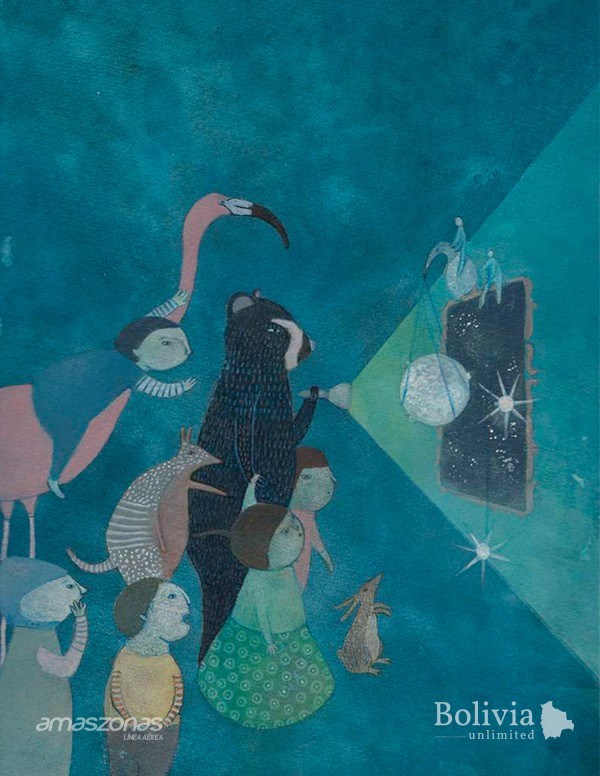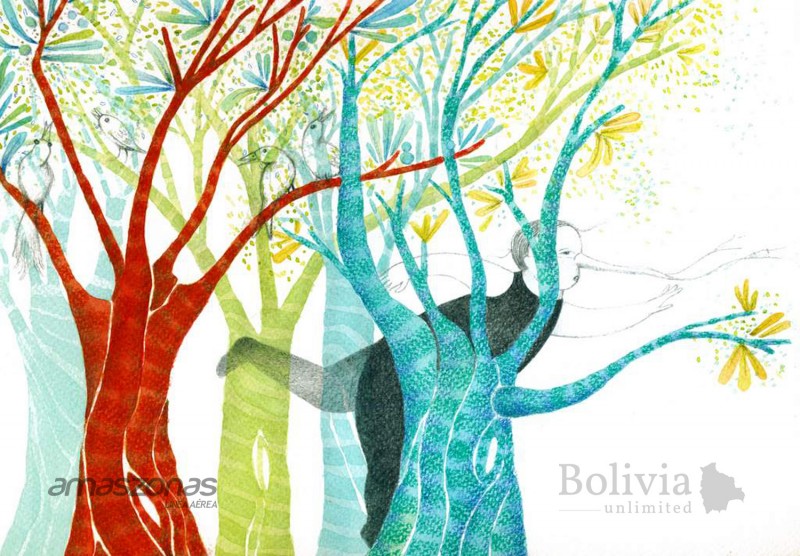Books for Bolivian Kids

03 Jan, 2020 | Rinalda Aay
Images: Courtesy of Academia Boliviana de Literatura Infantil y Juvenil, illustrations by Claudia Illanes Iturri
The Organisations Leading the Charge for Children’s Literature in Bolivia
For billions of people worldwide, reading is a skill often taken for granted. But it’s an essential exercise for childhood development that increases intelligence and empathy, and it enhances brain connectivity. Plus, the ability to read is essential to innumerable aspects of everyday life.
Although Bolivia has made significant inroads in increasing its literacy rate over the past few decades – as of 2015, the Bolivian adult literacy rate was 92.46 percent – there is room for improvement in providing children the materials and opportunities for reading. Human brains are most flexible early in life, making childhood the ideal time for learning vital skills, such as reading. There is much work to be done in terms of improving reading ability in Bolivia, and this work begins from the bottom up – with children.
Fortunately, there are groups in Bolivia world encouraging children’s literacy and literature. This allows children to develop both vital life skills and a love of literature, and provides otherwise unavailable access to culturally and educationally relevant books. Bolivian Express spoke with three organisations working to nurture children’s literature and, by extension, improve children’s opportunities throughout Bolivia.
Comité de Literatura Infantil y Juvenil (CLIJ)—Committee for Children and Youth Literature
Founded in 1964 by a group of writers and poets, CLIJ aims to elevate children’s literature and promote the cultural importance of youth reading.
The committee, comprised of volunteers from a variety of backgrounds and specialisations, works in parallel to the learning that children receive in schools. It recognises that families in Bolivia do not often have the money to buy books for at-home reading. But there are also other barriers.
‘The parents, they often don’t have enough school-based education. They cannot help at home to encourage children to read,’ says Pilar Martínez, the vice president of CLIJ’s La Paz branch. ‘That’s why we are stepping in for the parents, and our work is what should be done at home.’
CLIJ uses a variety of activities to achieve its goals. One is an event called ‘La Paz Leer’ (La Paz Reads). The committee sets up a ‘mobile library’ in the streets where people can sit down and read books that would otherwise be unavailable or too expensive to purchase. CLIJ also holds an annual International Congress of Literature for Children and Young People, the ninth of which was held last July. Educators, students, writers and researchers came together for four days of learning and teaching, preparing an international body of teachers and reading advocates to promote children’s literacy. CLIJ also publishes ‘Cuadernos de Literatura Infantil y Juvenil,’ a bulletin instructing adults about how to encourage children to read.
And, of course, CLIJ visits schools, sowing the seeds for a love of literature.
‘My favourite part,’ says Martínez, eyes lighting up, ‘is when we are telling some stories to the children and they are looking at us like “What is this? Who are these crazy women jumping and singing?” This is the best part, when you know that the children are really enjoying our stories.’
And that enjoyment is the real centre of the whole operation. CLIJ exists not only because its members want children to read; it exists because its members want children to love to read. This is the real goal.
‘We want children and young people to read books with pleasure, so that they can dream, so that they can imagine worlds, a lot of things,’ Martínez says. ‘For us, to read books with pleasure means that you don’t have an objective. It is just to enjoy the book. Later on, maybe years later, they will see the benefit of reading books. But now, we just want children to enjoy them.’
‘We want children and young people to read books with pleasure, so that they can dream, so that they can imagine worlds.’
—Pilar Martínez
Academia Boliviana de Literatura Infantil y Juvenil (ABLIJ)—Bolivian Academy of Children and Youth Literature
ABLIJ was founded in 2006 by Isabel Mesa Gisbert, Liliana de la Quintana, Rosalba Guzmán and Verónica Linares. They were supported by Sylvia Puentes de Oyenard, president of the Latin American Academy of Children and Youth Literature, Cuban writer Luis Cabrera Delgado and children’s literature specialist Rubén Silva.
ABLIJ focuses on forging relationships with and between children’s authors and illustrators, understanding the trends, history and context of children’s literature, and systematising the available information on the topic. Also, crucially, it conducts and publishes research about children’s literacy. This fills a vital gap in Bolivian literary academia.
‘Bolivia does not have researchers dedicated to children’s and youth literature because these have always been seen as lesser forms of literature,’ says Gisbert. ‘We, on the contrary, think it is foundational, and the way for a child to learn the skills to read adult literature… Children approach literature from an early age, and if it is not recognised that literature is part of their lives, there is a great void.’
ABLIJ is one of the foremost Bolivian organisations leading the widespread embracing of children’s books through the dissemination of research. It also aims to instigate the creation of a permanent children’s literature diploma or subject in Bolivian universities. This would ensure that education about children’s and youth literature is present in the training of professionals, and would further highlight its importance as a topic of research.
According to Gisbert, Bolivia still falls behind many other countries in terms of its literary culture. ‘If, in Argentina, 10,000 children’s and youth books are produced per year, then in Bolivia, there are 50 or at most 60 fictional children’s book publications,’ she says.
According to de la Quintana, this dearth of literature has to do with a lack of encouragement for authors. There are very few competitions that encourage writers, there are no comprehensive national reading plans, and few public or private libraries have a good selection of children’s books.
That said, progress is being made. Bolivian publishers are beginning to support children’s and youth literature, and ABLIJ continues to play a significant part in promoting children’s books as the culturally, historically and educationally vital artefacts they are.

As recently as 2008, children in Bolivia had limited options if they wanted to read books about their own country or cultural heritage. They were instead largely restricted to translations of foreign titles. Heidi Baer-Postigo, academic director of SIT Study Abroad in Bolivia, noticed this lack of books that her own children (of Bolivian-American identity) could identify with in terms of their Bolivian heritage. In 2008, two SIT Study Abroad students approached Baer-Postigo, proposing that they create children’s books about Bolivia for Bolivian children as part of their independent study. Baer-Postigo gave her approval, and Kids’ Books Bolivia was born.
Kids’ Books Bolivia’s collection of children’s books is now 45 titles strong. The books are published in Spanish and English, and sometimes in one of Bolivia’s 36 indigenous languages. They span a broad range of topics – including political allegories, environmental issues, sexual education and adoption – and most regions of Bolivia have been represented in some way, whether it be through food, life, culture, arts, history or the environment.
‘Our aims are to continue publishing books about important issues and to always find ways to respond more specifically to the local community and organisations,’ says Aliya Ellenby, Kids’ Books Bolivia’s project coordinator.
Demonstrating that creative approaches are often the best ones, one of the organisation’s most successful and longstanding partnerships is with the puppet ensemble Títeres Elwaky. The ensemble has created giant pop-up versions of two of the books from the collection and has also developed interactive storytelling formats with puppets for almost all the books. Kids’ Books Bolivia has also participated in numerous book fairs and has sets of their books in libraries across the country.
Kids’ Books Bolivia continues to work to broaden their base of local illustrators, and its books are included in school curricula and are available in libraries countrywide. Ellenby also hopes to see the organisation run weekly creative literacy workshops at its home base of Cochabamba and participate in more book fairs.
As for CLIJ and ABLIJ, a deep respect and love of books is central to Kids’ Books Bolivia’s operations. Ellenby says that books have the potential to engage the hearts and minds of children. ‘I grew up in a family of readers,’ she says. ‘I honestly can’t imagine my life without books and reading. I have worked with children who have never owned a book, who have never had a book read to them at bed time… But I have never worked with a child whose eyes did not widen when I opened the first page, who didn’t have questions as soon as they saw the first illustration… Literacy and access to literature responds to the natural curiosity and imagination of every child.’
Comments
04 Mar, 2021 | 10:56








19 Feb, 2021 | 22:43